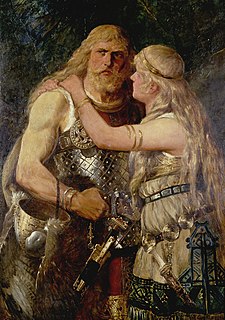 W
W1 Corinthians 13 is the thirteenth chapter of the First Epistle to the Corinthians in the New Testament of the Christian Bible. It is authored by Paul the Apostle and Sosthenes in Ephesus. This chapter covers the subject of Love. In the original Greek, the word ἀγάπη agape is used throughout the "Ο ύμνος της αγάπης". This is translated into English as "charity" in the King James version; but the word "love" is preferred by most other translations, both earlier and more recent.
 W
WAttachment theory is a psychological, evolutionary and ethological theory concerning relationships between humans. The most important tenet is that young children need to develop a relationship with at least one primary caregiver for normal social and emotional development. The theory was formulated by psychiatrist and psychoanalyst John Bowlby.
 W
WChastity is a virtue related to temperance. Someone who is chaste refrains either from sexual activity considered immoral or any sexual activity, according to his or her state of life. In some contexts, for example when making a vow of chastity, chastity would mean the same as celibacy.
 W
WThe color wheel theory of love is an idea created by Canadian psychologist John Alan Lee that describes six styles of love, using several of the Latin and Greek words for love. First introduced in his book Colours of Love: An Exploration of the Ways of Loving (1973), Lee defines three primary, three secondary and nine tertiary love styles, describing them in terms of the traditional color wheel. The three primary types are eros, ludus and storge, and the three secondary types are mania, pragma and agape.
 W
WCourage is the choice and willingness to confront agony, pain, danger, uncertainty, or intimidation. Physical courage is bravery in the face of physical pain, hardship, even death or threat of death, while moral courage is the ability to act rightly in the face of popular opposition, shame, scandal, discouragement, or personal loss.
 W
WCourtship is the period of development towards an intimate relationship wherein a couple get to know each other and decide if there will be an engagement, followed by a marriage. A courtship may be an informal and private matter between two people or may be a public affair, or a formal arrangement with family approval. Traditionally, in the case of a formal engagement, it is the role of a male to actively "court" or "woo" a female, thus encouraging her to understand him and her receptiveness to a marriage proposal.
 W
WEcstasy is a subjective experience of total involvement of the subject, with an object of their awareness. In classical Greek literature it refers to removal of the mind or body "from its normal place of function."
 W
WEros is a concept in ancient Greek philosophy referring to sensual or passionate love, from which the term erotic is derived. Eros has also been used in philosophy and psychology in a much wider sense, almost as an equivalent to "life energy". Protestant author C.S. Lewis posits it as one of the four ancient Greek words for love in Christianity, alongside storge, philia, and agape.
 W
WFaithfulness is the concept of unfailingly remaining loyal to someone or something, and putting that loyalty into consistent practice regardless of extenuating circumstances. It may be exhibited by a husband or wife who, in a sexually exclusive marriage, does not engage in sexual relationships outside of the marriage. It can also mean keeping one's promises no matter the prevailing circumstances, such as God's covenant to love his people. Literally, it is the state of being full of faith in the sense of steady devotion to a person, thing or concept.
 W
WFlirting or coquetry is a social and sexual behavior involving spoken or written communication, as well as body language, by one person to another, either to suggest interest in a deeper relationship with the other person, or if done playfully, for amusement.
 W
WFootsies is a flirting game where two people touch feet under a table or otherwise concealed place, often as a romantic prelude. It is a game played either as an act of flirtatious body language, or simply for enjoyment. Although footsies is not inherently romantic, the nature of it as playful touching is often done between lovers as a sign of affection, and most often without discussion. The term comes from a 1940s humorous diminutive of foot.
 W
WForgiveness is the intentional and voluntary process by which a victim undergoes a change in feelings and attitude regarding an offense, and overcomes negative emotions such as resentment and vengeance. Theorists differ, however, in the extent to which they believe forgiveness also implies replacing the negative emotions with positive attitudes. Forgiveness is different from condoning, excusing, forgetting, pardoning, and reconciliation.
 W
WThe Four Loves is a 1960 book by C. S. Lewis which explores the nature of love from a Christian and philosophical perspective through thought experiments. The book was based on a set of radio talks from 1958 which had been criticised in the U.S. at the time for their frankness about sex.
 W
WHarry Gordon Frankfurt is an American philosopher. He is professor emeritus of philosophy at Princeton University, where he taught from 1990 until 2002. Frankfurt has also taught at Yale University, Rockefeller University, and Ohio State University.
 W
WFriendship is a relationship of mutual affection between people. It is a stronger form of interpersonal bond than an association, and has been studied in academic fields such as communication, sociology, social psychology, anthropology, and philosophy. Various academic theories of friendship have been proposed, including social exchange theory, equity theory, relational dialectics, and attachment styles.
 W
WThe term happiness is used in the context of mental or emotional states, including positive or pleasant emotions ranging from contentment to intense joy. It is also used in the context of life satisfaction, subjective well-being, eudaimonia, flourishing and well-being.
 W
WAttachment theory, originating in the work of John Bowlby, is a psychological, evolutionary and ethological theory that provides a descriptive and explanatory framework for understanding interpersonal relationships between human beings.
 W
WHook-up culture refers to a culture built on the approved practice of engaging in hook-ups, or sexual encounters between two or more individuals where it is understood that commitment, relationships, and emotional feelings are not expected outcomes. Defining a hook-up is ambiguous because it can have a variety of meanings ranging from casual Kissing to foreplay and oral sex, or in some cases, it can mean participating in sexual intercourse. Hook-ups typically only last a short time and those involved are typically only interested in experiencing sexual intimacy and pleasure. Not all hook-ups can be classified as "one-night stands", however, since some people believe they can eventually lead to dating or more personal connections. While people have engaged in casual sex for many years, the act of "hooking-up" has become increasingly popular on college and university campuses in the United States over the last decade. Hooking up has become common for many college students, and the practice has replaced more traditional 20th century ideas about dating. Furthermore, social media sites like Facebook or Match, and phone applications like Grindr and Tinder have given users an opportunity to form connections with other people who have similar sexual interests or desires. Studying hook-up culture focuses on its influences on the formation and management of friendships and romantic relationships. The growth of hook-up culture is also shaping gender roles, specifically in regards to sexual behavior. Aside from these aspects of hook-ups, taking part in uncommitted sex can lead to potential negative physical and emotional impacts.
 W
WHumility is the quality of being humble. Dictionary definitions accentuate humility as a low self-regard and sense of unworthiness. In a religious context humility can mean a recognition of self in relation to a deity or deities, and subsequent submission to said deity as a member of that religion. Outside of a religious context, humility is defined as being "unselved", a liberation from consciousness of self, a form of temperance that is neither having pride nor indulging in self-deprecation.
 W
WThe Leipzig Debate was a theological disputation originally between Andreas Karlstadt, Martin Luther, and Johann Eck. Karlstadt, the dean of the Wittenberg theological faculty, felt that he had to defend Luther against Eck's critical commentary on the 95 theses and so challenged Johann Eck, a professor of theology at Ingolstadt university, to a public debate concerning the doctrines of free will and grace. The Leipzig Debate took place in June and July 1519 at Pleissenburg Castle in Leipzig, Germany. Its purpose was to discuss Martin Luther's teachings and was initiated and conducted in the presence of George, Duke of Saxony, an opponent of Luther. Eck, considered the master debater in Germany, was concerned about clerical abuses, but his life's work had been dedicated to the defence of Catholic teachings and combating heresy.
 W
WLimerence is a state of mind which results from a romantic attraction to another person and typically includes obsessive thoughts and fantasies and a desire to form or maintain a relationship with the object of love and have one's feelings reciprocated. Limerence can also be defined as an involuntary state of intense romantic desire.
 W
WLoneliness is an unpleasant emotional response to perceived isolation. Loneliness is also described as social pain—a psychological mechanism which motivates individuals to seek social connections. It is often associated with an unwanted lack of connection and intimacy. Loneliness overlaps and yet is distinct from solitude. Solitude is simply the state of being apart from others; not everyone who experiences solitude feels lonely. As a subjective emotion, loneliness can be felt even when surrounded by other people; one who feels lonely, is lonely. The causes of loneliness are varied. They include social, mental, emotional, and environmental factors.
 W
WLove Is... is a comic strip created by New Zealand cartoonist Kim Casali in the 1960s. The cartoons originated from a series of love notes that Grove drew for her future husband, Roberto Casali. They were published in booklets in the late 1960s before appearing in strip form in a newspaper in 1970, under the pen name "Kim". They were syndicated soon after and the strip is syndicated worldwide today by Tribune Content Agency. One of her most famous drawings, "Love Is...being able to say you are sorry", published on February 9, 1972, was marketed internationally for many years in print, on cards and on souvenirs. The beginning of the strip coincided closely with the 1970 film Love Story. The film's signature line is "Love means never having to say you're sorry." At the height of their popularity in the early to mid 1970s, the cartoons were earning Casali around five to six million dollars annually.
 W
WThe love of God is a prevalent concept both in the Old Testament and the New Testament.
 W
WLuceafărul is a narrative poem by Romanian author Mihai Eminescu. It was first published in 1883, out of Vienna, by Romanian expatriates in Austria-Hungary. It is generally considered Eminescu's masterpiece, one of the greatest accomplishments in Romanian literature, and one of the last milestones in Europe's Romantic poetry. One in a family or "constellation" of poems, it took Eminescu ten years to conceive, its final shape being partly edited by the philosopher Titu Maiorescu. During this creative process, Eminescu distilled Romanian folklore, Romantic themes, and various staples of Indo-European myth, arriving from a versified fairy tale to a mythopoeia, a self-reflection on his condition as a genius, and an illustration of his philosophy of love.
 W
WMarriage, also called matrimony or wedlock, is a culturally recognised union between people, called spouses, that establishes rights and obligations between them, as well as between them and their children, and between them and their in-laws. The definition of marriage varies between cultures and religions, and within a culture or religion, over time. It has expanded and also constricted in terms of who and what is encompassed. Typically, it is an institution in which interpersonal relationships, usually sexual, are acknowledged or sanctioned. In some cultures, marriage is recommended or considered to be compulsory before pursuing any sexual activity. When defined broadly, marriage is considered a cultural universal. A marriage ceremony is called a wedding.
 W
WModesty, sometimes known as demureness, is a mode of dress and deportment which intends to avoid the encouraging of sexual attraction in others. The word "modesty" comes from the Latin word modestus which means "keeping within measure". Standards of modesty are culturally and context dependent and vary widely. In this use, it may be considered inappropriate or immodest to reveal certain parts of the body. In some societies, modesty may involve women covering their bodies completely and not talking to men who are not immediate family members; in others, a fairly revealing but one-piece bathing costume is considered modest while other women wear bikinis. In some countries, exposure of the body in breach of community standards of modesty is also considered to be public indecency, and public nudity is generally illegal in most of the world and regarded as indecent exposure. For example, Stephen Gough, a lone man attempting to walk naked from south to north in the United Kingdom, was repeatedly imprisoned. However, nudity is at times tolerated in some societies; for example by Digambara monks in India, who renounce clothing for ascetic reasons, and during a World Naked Bike Ride.
 W
WPederasty in ancient Greece was a socially acknowledged romantic relationship between an adult male and a younger male usually in his teens. It was characteristic of the Archaic and Classical periods. The influence of pederasty on Greek culture of these periods was so pervasive that it has been called "the principal cultural model for free relationships between citizens."
 W
WPhilia, often translated "brotherly love", is one of the four ancient Greek words for love: philia, storge, agape and eros. In Aristotle's Nicomachean Ethics, philia is usually translated as "friendship" or affection. The complete opposite is called a phobia.
 W
WRomance is an emotional feeling of love for, or a strong attraction towards another person, and the courtship behaviors undertaken by an individual to express those overall feelings and resultant emotions.
 W
WStorge or familial love refers to natural or instinctual affection, such as the love of a parent towards offspring and vice versa.
 W
WUnrequited love or one-sided love is love that is not openly reciprocated or understood as such by the beloved. The beloved may not be aware of the admirer's deep and strong romantic affection, or may consciously reject it. The Merriam Webster Online Dictionary defines unrequited as "not reciprocated or returned in kind".